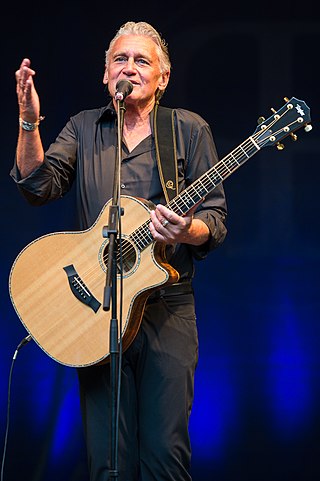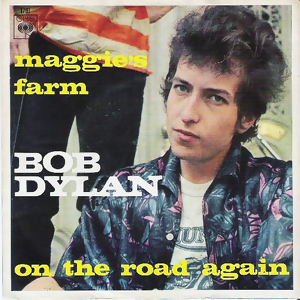Folk rock is a genre of rock music with heavy influences from English folk and American folk music. Combining the elements of folk and rock music, it arose in the United States, Canada, and the United Kingdom in the mid-1960s. In the U.S., folk rock emerged from the folk music revival. Performers such as Bob Dylan and the Byrds—several of whose members had earlier played in folk ensembles—attempted to blend the sounds of rock with their pre-existing folk repertoire, adopting the use of electric instrumentation and drums in a way previously discouraged in the U.S. folk community. The term "folk rock" was initially used in the U.S. music press in June 1965 to describe the Byrds' music.

A singer-songwriter is a musician who writes, composes, and performs their own musical material, including lyrics and melodies. In the United States, the category is built on the folk-acoustic tradition with a guitar, although this role has transmuted through different eras of popular music. Traditionally, these musicians would write and sing songs personal to them. Singer-songwriters often provide the sole musical accompaniment to an entire song. The piano is also an instrument of choice.
A roots revival is a trend which includes young performers popularizing the traditional musical styles of their ancestors. Often, roots revivals include an addition of newly composed songs with socially and politically aware lyrics, as well as a general modernization of the folk sound.
"Scarborough Fair" is a traditional English ballad. The song lists a number of impossible tasks given to a former lover who lives in Scarborough, North Yorkshire. The "Scarborough/Whittingham Fair" variant was most common in Yorkshire and Northumbria, where it was sung to various melodies, often using Dorian mode, with refrains resembling "parsley, sage, rosemary and thyme" and "Then she'll be a true love of mine." It appears in Traditional Tunes by Frank Kidson published in 1891, who claims to have collected it from Whitby.
Germany claims some of the most renowned composers, singers, producers and performers of the world. Germany is the largest music market in Europe, and third largest in the world.

Vienna has been an important center of musical innovation. 18th- and 19th-century composers were drawn to the city due to the patronage of the Habsburgs, and made Vienna the European capital of classical music. Joseph Haydn, Wolfgang Amadeus Mozart, Ludwig van Beethoven, Franz Schubert and Johann Strauss II, among others, were associated with the city, with Schubert being born in Vienna. During the Baroque period, Slavic and Hungarian folk forms influenced Austrian music. Vienna's status began its rise as a cultural center in the early 16th century, and was focused on instruments including the lute.

Austrian folk dancing is mostly associated with Schuhplattler, Ländler, polka and waltz. However, there are other dances such as Zwiefacher, Kontratänze and Sprachinseltänze.
"My Back Pages" is a song written by Bob Dylan and included on his 1964 album Another Side of Bob Dylan. It is stylistically similar to his earlier folk protest songs and features Dylan's voice with an acoustic guitar accompaniment. However, its lyrics—in particular the refrain "Ah, but I was so much older then/I'm younger than that now"—have been interpreted as a rejection of Dylan's earlier personal and political idealism, illustrating his growing disillusionment with the 1960s folk protest movement with which he was associated, and his desire to move in a new direction. Although Dylan wrote the song in 1964, he did not perform it live until 1988.

Rainhard Jürgen Fendrich is an Austrian singer, composer, entertainer, and actor. He is one of the most successful Austropop musicians, and his songs are written in Viennese German. He is very popular in Austria and in Bavaria, but less so in other German-speaking countries and regions. In non-German-speaking countries he is little known. His song from 1990, "I Am from Austria" is still popular in Austria and considered to be the "secret national anthem".

Wolfgang Ambros is an Austrian singer-songwriter. He is one of the most important contemporary Austrian musicians and is considered to be one of the founders of Austropop.

"Maggie's Farm" is a song written by Bob Dylan, recorded on January 15, 1965, and released on the album Bringing It All Back Home on March 22 of that year. Like many other Dylan songs of the 1965–66 period, "Maggie's Farm" is based on electric blues. It was released as a single in the United Kingdom on June 4, 1965, and peaked at No. 22 on the chart. Dylan only needed one take to record the song, as may be heard on the exhaustive 18-disc Collector's Edition of The Bootleg Series Vol. 12: The Cutting Edge 1965–1966, which includes every alternate take recorded during Dylan's 1965–1966 sessions but only the one version of "Maggie's Farm".
DÖF, , was a 1980s Austrian-German Neue Deutsche Welle pop band, best known for their 1983 single "Codo".

Luttenberger*Klug is a pop duo from Styria, Austria and consist of Michelle Luttenberger and Chrissi Klug.

Georg Franz Danzer was an Austrian singer-songwriter. Although he is credited as one of the pioneers of Austropop, he always refused to be part of this genre.
"The House of the Rising Sun" is a traditional folk song, sometimes called "Rising Sun Blues". It tells of a person's life gone wrong in the city of New Orleans. Many versions also urge a sibling or parents and children to avoid the same fate. The most successful commercial version, recorded in 1964 by the British rock band The Animals, was a number one hit on the UK Singles Chart and in the US and Canada. As a traditional folk song recorded by an electric rock band, it has been described as the "first folk rock hit".

Radio Oberösterreich is the regional radio for Upper Austria, and is part of the Österreich 2 group. It is broadcast by the ORF, and the programs from Radio Oberösterreich are made in the ORF Oberösterreich Studio.

Thomas Spitzer is an Austrian lyricist, composer, singer, guitarist and graphic designer. He is a founding member the band Erste Allgemeine Verunsicherung (EAV), whose lyrics, album artwork and illustrations come almost exclusively from him.

Ludwig Hirsch was an Austrian singer/songwriter and actor.

"Ganz Wien" is the debut single by Falco, originally released in 1981. It later appeared on his 1982 debut album Einzelhaft.











